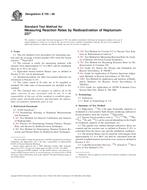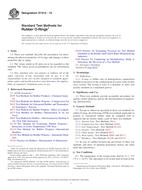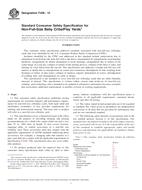1.1 These test methods and practices, given under the headings titled Composition, Consistency, Stability, and Examination of Residue, cover the examination of asphalt emulsions composed principally of a semisolid or liquid asphaltic base, water, and an emulsifying agent. The test methods cover the following tests and practices:
| Test | Sections |
| Composition: | |
| Water Content | 4-10 |
| Residue and Oil Distillate by Distillation | See Test Method D 6997 |
| Residue by Evaporation | See Test Method D 6934 |
| Particle Charge of Cationic Emulsified Asphalts | See Test Method D 7402 |
| Consistency: | |
| Viscosity (Saybolt Furol) | See Test Method D 7496 |
| Stability: | |
| Demulsibility | See Test Method D 6936 |
| Settlement | See Test Method D 6930 |
| Cement Mixing | See Test Method D 6935 |
| Sieve Test | See Test Method D 6933 |
| Aggregate Coating | See Practice D 6998 |
| Miscibility with Water | See Test Method D 6999 |
| Freezing | See Practice D 6929 |
| Coating Ability and Water Resistance | 11-18 |
| Storage Stability of Asphalt Emulsion | See Test Method D 6930 |
| Examination of Residue | 19-26 |
| Identification Test for Rapid Setting Cationic Emulsified Asphalt | 27-34 |
| Identification of Cationic Slow Set Emulsions | See Test Method D 7402 |
| Field Coating Test on Emulsified Asphalts | 35-40 |
| Emulsified Asphalt/Job Aggregate Coating Test | 41-46 |
| Density of Emulsified Asphalt | See Test Method D 6937 |
| Residue by Low-Temperature Vacuum Distillation | See Test Method D 7403 |
1.2 The values stated in SI units are to be regarded as the standard. The values given in parentheses are for information only.
1.3 This standard does not purport to address all of the safety concerns, if any, associated with its use. It is the responsibility of the user of this standard to establish appropriate safety and health practices and determine the applicability of regulatory limitations prior to use.
4.1 This test method covers the procedure for determining the water content of an emulsified asphalt by reflux distillation using a water trap.
11.1 This test method is intended to aid in the identification of asphalt emulsions suitable for mixing with coarse graded calcareous aggregates. It can be applied to other aggregates. (See Note 2).
19.1 Tests for specific gravity, ash content, solubility in trichloroethylene, penetration, ductility and float test are suggested for examination of the emulsified asphalt residue obtained by distillation or evaporation (see Test Method D 6934 and Test Method D 6997).
27.1 This practice covers a procedure for identifying rapid-setting cationic emulsified asphalts. Their inability to coat a specific silica sand distinguishes them from medium and slow setting cationic grades.
35.1 This is a quick field test method to ascertain the compatibility of an emulsified asphalt with the job aggregate.
41.1 This practice may be used to identify the adequacy of slow setting grade of emulsified asphalt to mix with and coat a dense and fine-graded job aggregate. It is a laboratory practice of screening emulsified asphalt candidates for mixing with and coating job aggregates and is not to be construed as a mix design test method.
Product Details
- Published:
- 06/01/2009
- Number of Pages:
- 9
- File Size:
- 1 file , 160 KB
- Redline File Size:
- 2 files , 310 KB


